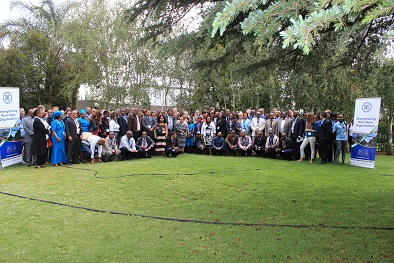The dialogue was organised by SADC in cooperation with GWPSA and was part of the SADC RBO series of dialogues, which is funded by GiZ Transboundary Water Management (TWM) Programme. In total, 200 people from 15 countries attended the conference.
The jointly organised event aimed to lay the foundation for strengthening regional and local voices, enhancing cooperation and articulating priorities to shape the climate agenda in the SADC region as well as establish linkages between SADC climate change programmes, RBOs, and local programmes.
The conference was inaugurated by dignitaries from the Department of Water Affairs - Ministry of Water & Sanitation, South Africa – Deputy Director General Ms Lindiwe Lusenga; The Lead ICP – Water, Mr. Joakim Schimdt, AMCOM Secretariat representative, Mr. Charles Nganguoe, and Eng. Remigious Makumbe (SADC Secretariat). The opening remarks all applauded the role SADC is playing in addressing environmental problems including climate change adaptation and mitigation.
In her opening remarks, Ms Lindiwe Lusenga recognised that RBOs in the region are key to the management of shared water courses in the region. She urged participants on the need to accelerate progress in the implementation of various strategies that SADC has in place in promoting resilience.
Eng. Remigious Makumbe (SADC) underlined that crucial achievements have been made in the field of climate change and resilience in water related disasters in the region, however several key challenges remain. For instance leveraging of financial resources, and further work on the roles of RBOs can play in DRR in view of the SADC Programmes and existing DRR initiatives.
Mr. Charles Nganguoe (AMCOW) in his opening remarks agreed to supporting the SADC Climate Change Programme, which he lamented has so far has made great strides in implementation. In support of this, Joakim Schumdt, speaking on behalf of the ICPs, mentioned that “Climate change has been an issue at the forefront of cooperation for many years and the ICPs have made an unconditional commitment to supporting the SADC agenda on resilience”.
The programme comprised four sessions: namely – The opening session; the second session which will include an overview from SADC on how they are supporting RBO. Included in this session have been reports where LIMCOM, OKAKOM, ORASECOM, and ZAMCOM shared updates on their current activities, challenges and way forward; and the third session which comprised presentation on the TWM gender programme, and findings from the TWM Climate Change Mainstreaming/ water financing studies undertaken in the SADC states. The fourth session comprised presentations on flood risk management and river basin organisations. Presentations included a general overview of water related disasters in the region; local indigenous knowledge for coping with water related disasters, and current SADC programmes addressing water related disasters and risk reduction mechanisms (DRRU, WD, Met-CSC). During the dialogue, SADC also launched four videos under the “Bridging Water Series” that have been completed.
Particular challenges and recommendations highlighted at the dialogue included the need for RBOs to further promote active climate change and water related disaster by fostering collaboration awareness, education, and capacity-building, standardising data and facilitating access to disaster related information for member states, in line with SADC DRR vision that supports the implementation of actions that mitigate and adapt to climate change and disaster risk management. Discussions also pointed to the need for improvements in gender mainstreaming, and adapting the use of Local Indigenous Knowledge systems and practices.
The key outcome of the conference was the call for greater co-operation in the region. Through the dialogue, the stakeholders specifically acquired a better understanding of the situation and the failure aspects to be addressed in regional cooperation and resilience in water related disasters, proposed SADC regional best practices on resilience, provided recommendations on appropriate support to the RBOs where needed, and made proposals on the key elements of the 4th Phase of the SADC Water Programme (RSAP IV).
This workshop is the 6th in a series of RBO workshops held in various countries within the SADC region. The last workshop was held in June 2012 in Harare Zimbabwe on the theme “Monitoring the Implementation of the Protocol on Shared Watercourses”. In the recent years, RBOs have been much involved in documenting the river basins and providing the public with a better understanding of each basin as a whole. However, in an environment where climate changes cut across national boundaries and river basins are being overwhelmed by the various impacts of climate change e.g floods and droughts, there is a real need for all RBOs to share experiences with regards to their abilities to plan effectively and be better prepared for those calamities. This is aligned with the disaster risk reduction and management which entails planning, preparation and effective response. It therefore became imperative to update the information and assess the work since then through a regional dialogue. The ultimate aim of the dialogue was therefore to enhance coordination amongst the various institutions towards the same goal which is to optimize the resilience of countries and river basins to natural disasters related to climate variability.
